Vladimir Putin Isn't Crazy And He Isn't Hitler. He's Just A Sellout. And Live Not By Lies, Social Media Edition
Why nationalists love selling out to China while lying to you!
You know much of the coverage of Ukraine is fake but you know not why or how. The “Ghosts of Kyiv” and the fate of the soldiers on Snake Island are both fabricated. You can tell you are being lied to and so you either turn it off or you indulge completely in the war porn.
This is good for CNN/FOX/MSNBC/LSD/ADHD (lok, jk)’s ratings so you ultimately become a slave to the TV and they get to lie to their advertisers that you were paying enough attention to buy whatever product they are hawking at the dumb and/or elderly. It’s not a business model but it is exploitative.
But over time, if you can think (and even among the best of us, this is sometimes in doubt), you come to resent the myths. You know that isn’t so. You know that much of the coverage is fake. You recall vaguely all the propaganda around the Iraq War or Bosnia before that. Babies in incinerators. You recall that Ben Shapiro told you that Chuck Hagel was a part of “Friends of Hamas,” a fake group. But then again, Ben Shapiro is a fake figure who is totally owned by the Chinese. You didn’t know that, of course, because you weren’t allowed to know it.
This post is to help you understand what is real and how to stop the fakery. A general rule of thumb I use: if the post elicits an emotion, rather than presenting facts, I dismiss it outright.

Social media makes you feel. And feelings don’t care about your facts. To think that tweets have power is to excuse the hours, weeks, months and years you’ve misspent tweeting. It’s to turn one of your vices into a supposed virtue.
Do you really believe that? No, probably not. But it makes you feel good about yourself and the role you play in the world. It’s a cul de sac, obviously, and a narcotic. (Dopamine pump.)
You know, though, that if tweets had real power, Andrew Yang would be mayor of New York City. He isn’t. And all your meme posting, however fun, doesn’t change how many tanks Vladimir Putin has en route to Kiev.
To learn from the past means opening up books written before you were born. You got to go back to see what’s in front of you.
One of those authors you might have heard about. His name was Alexander Solzhenitsyn. Your history teacher might have mentioned him during the Cold War unit. I myself require my employees to read his seminal 1974 “Live Not By Lies” essay. (No, not the silly Dreher book.)
But you’re not supposed to read more than a little bit of Solzhenitsyn, if only to condemn the Soviet Union’s inhuman system of gulags.
There was always a little evidence that Solzhenitsyn didn’t exactly get the memo that neoliberalism or freedom or whatever-ism was on the march and soon to take Moscow.
You can read my old professor Charles Kesler’s review of the 1978 Harvard speech here. Kesler notes that Solzhenitsyn condemned then “illusion that danger may be abolished through successful diplomatic negotiations or by achieving a balance of armed forces.”
Among my favorite lines? “We shall have to rise to a new height of vision, to a new level of life where our physical nature will not be cursed as in the Middle Ages, but, even more importantly, our spiritual being will not be trampled upon as in the Modern Era.” Beautiful stuff.
So the argument between the Russians and the West is more profound than it appears.
I could go on. You aren’t supposed to know that Solzhenitsyn was an avid fan of Vladimir Putin. Putin repaid the compliment when he called Sozhenitsyn a “true patriot.”
Or to read Solzhenitsyn’s book, Two Hundred Years Together (2002), which many of the Eastern European Jews who populate Sovietology and post-USSR studies act as if it was never published.
If you bring it up, you’ll get canceled and maybe even called an anti-Semite. When I, as a naive college student, asked Professor Dan Mahoney why Solzhenitsyn’s later work wasn’t included in The Solzhenitsyn Reader: New and Essential Writings, 1947-2005, our hitherto pleasant conversation more or less ended. We don’t talk about Bruno. And some writings are more essential than others, just as some national tragedies are more deserving of attention and respect than others. And if you disagree, you are a bad person. Maybe even insane.
Still, if you want to, you know, understand a nuclear power who might obliterate you and all that you hold dear, it’s a little incumbent upon you to understand how one of the greatest Russian thinkers thought of Ukraine.
Let’s take a look.
“Events in Ukraine, ever since the time of the referendum in 1991, with its poorly formulated options, have been a constant source of pain and anger to me. I have written and spoken about this often. The fanatic oppression and suppression of the Russian language there (a language which polls show is consistently the preferred language of 60% of the people there) is a beastly methodology aimed primarily against the cultural prospects of Ukraine itself. The vast territories which were never part of historic Ukraine, such as Crimea, Novorosiya and the entire southeast were forcibly and arbitrarily consumed into the territory of modern Ukraine and made hostage to Ukraine’s desires to join NATO…. It is all a simple minded, indeed simpleton and cruel joke perpetuated against the entire history of XIX and XX century Russia. Given these circumstances, Russia will never, in any way, betray the many millions of Russian speaking peoples in Ukraine. Russia will never abandon the ideal of unity with them.” (Moscow News, interview with W. T. Trietiakov published 28 April/4May 2006)
Is Putin simply following the path of his teacher?
Perhaps. Then again, perhaps it’s just a pretense. We know that Vladimir Putin’s government has sold out often and enthusiastically to the Chinese.
Is Putin playing leader of the Russian people so that they won’t look too closely at how he and so many others have sold out the Russians?
And isn’t this motivation a lot more interesting than Putin = Hitler?
And if that weren’t interesting enough, what if I told you that so many of the nationalists running around today are in fact witting and unwitting Chinese agents?
Why would Russia be any different?
Maybe we ought to force the Chinese to develop the Russian natural resource assets, after all, while we take back Africa. The Russians and Chinese deserve each other and I, for one, would enjoy watching them try to cheat one another.
Ideally the Russians would give up their wayward approach and maybe the sanctions will achieve that objective. I tend to doubt it.
Science fiction writer David Brin suggests an option.
Putin has spent the last year preparing to endure economic sanctions, e.g. setting up massive oil and wheat sales to the southeast, stashing cash, stockpiling and firming alliances with OPEC to keep oil prices high. And (I sci fi imagine) possibly pre-selling swathes of Siberia.
Nothing much can be done immediately about that South-Eastward prop-pillar. But the one bunch we can armtwist is the Saudis. We need to say “Either you start pumping now, till oil prices fall, or you can expect that our overtures to Iran will ramp up and our friendliness to you will decline in meaningful and painful ways."
Maybe it’s time for the Saudis and the Emiratis to be better friends.
It’s fair if you want to ignore the oligarch mob war unfolding on the other side of the world. You’re a normal person and you have normal people concerns, like your family and paying for every day living. Lord knows it ain’t cheap.
But the oligarchs are interested in you. They buy sports teams and even trade them amongst each other. Witness Mikhail Prokhorov selling The Nets to Alibaba’s Joe Tsai.
And they buy American presidential families.
And of course, one of them bought Cleveland.
As an American you have something that they want — and they’ll do anything to hide their assets here. It’s safe and it has rules.
First, we have explored what an oligarch is elsewhere.
In our neo-feudal society when you hear democracy, think technocracy. When you hear republic, think oligarchy. There are good elites and bad elites, of course. This we know.
How do you discipline oligarchs? The knight’s code was an answer. Pop culture may be another. Can an oligarch be a knight? The two figures of our top grossing cinema — Batman and Ironman — are oligarchs who decide what the law is. They lack super powers save their money. Those are works of fiction but their popularity raises interesting questions about why it is that we see so few billionaires that are publicly spirited.
Still, can oligarchs discipline the mad king? In one sense the Magna Carta is an answer. You kidnap the king and you dictate your terms. Machiavelli’s Discourses on Livy is quite good on when you can use assassination to remove a bad king: “all conspiracies are made by great men of those very familiar to the prince.” To conspire against the King, though, is to always make yourself vulnerable — before, during, and after. Just ask the MacBeths.
Russian oligarchs Oleg Deripaska and Mikhail Fridman suggest another possibility: Simply refusing to follow the Mad King’s commands.
One might even offer the Russian oligarchs who refuse the Mad King a sort of amnesty if they are helpful to our objectives. That would be the gentlemanly thing to do.
A friend who has worked with Fridman reports:
“Mikhail is a Ukrainian Jew. He once told me that he wanted to be a nuclear physicist but he couldn’t get into the top schools. So he decided to make money instead,” my friend reports. “He’s actually a pretty good guy. He’s tough but he keeps his word. On a handshake.”
I myself have had some dealings with great powers and their oligarchs — Chinese, American, and Russian. Of them all, I’ve come to like the Russian ones. They don’t act on pretense. Nor is there ever any doubt about what they are up to. They don’t pretend to be making the world a better place. They don’t create elaborate SPACs to con the public. Nor do they cut a deal with you and renegotiate your deal later as has happened to me with both Chinese and American oligarchs. When the Russians speak publicly — and they rarely do — they are direct and to the point. They have to be.
In the last few years American policy has been to make states responsible for their oligarchs.
Alas, some states are by their very nature irresponsible. They are mobocracies pretending to be democracies. And they get quite a bit if they manage to lie. They get access to the West’s financial system.
Ukraine has behaved irresponsibly. So too has Moldova.
When Zelensky talks of acquiring nuclear weapons that’s not acceptable. Ukraine is not a functioning enough state to deserve those weapons.
Kholomoisky is a bad oligarch. His pet is Zelensky. Or is it court jester?

Could it be that Zelensky’s pledge to cut down on corruption was really cutting down the competition?


How bad is Kholomoisky? Let us count the ways.


Trevor Sutcliffe’s work remains essential here. (I don’t have Twitter but I’d love to chat with Sutcliffe, so please reach out Trevor.)
Just look at how much corruption that Kholomoisky got into. It’s truly epic. And yes, billions of dollars came to America and Europe.
Putin particularly came to loathe Kholomoisky.

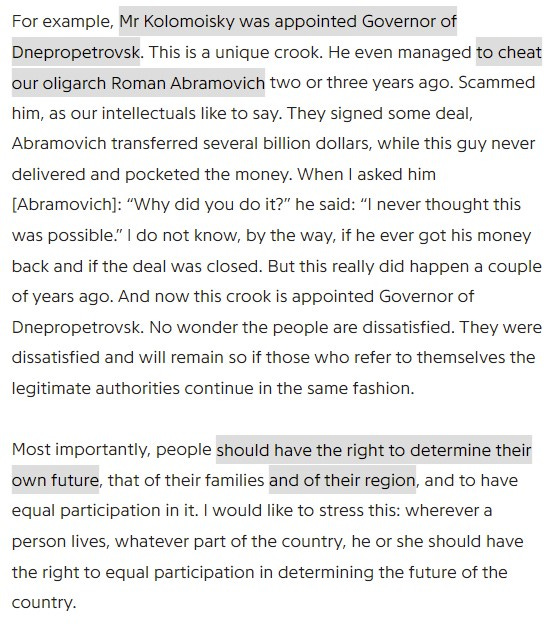
Some years ago I met a representative of Russian oligarch Mikhail Prokhorov who wanted to know how to pay a bribe to protect Prokhorov’s real estate dealings in New York. I didn’t know how and we never did business though my other dinner guest likely did. That’s a story for another time, I suspect.
To do business in modern America you’ll run into them. Know that when you do you are actually talking to a state.
Weak states have oligarchs. Strong ones have bureaucracies. In a weak state you have to assign someone a responsibility. Therefore Russia is an oligarchy and China and America are largely a bureaucracy masquerading as a representative democracy. You can vote all you like in America but it doesn’t seem to change much does it?
But every state has some oligarchs. Adams and Jefferson called this the natural aristocracy. I rather like how Jefferson lays it out.
The natural aristocracy I consider as the most precious gift of nature, for the instruction, the trusts, and government of society. And indeed, it would have been inconsistent in creation to have formed man for the social state, and not to have provided virtue and wisdom enough to manage the concerns of the society.
Natural aristocracies are permitted so long as they are quiet and subservient. That is, so long as their monopolies are natural and not predatory. This is what Silicon Valley has yet to understand. Peter Thiel has made a fetish of monopoly — elevating it to a principle even — and we will explore how many of the Ukrainian mobsters are huge fans of Silicon Valley and perhaps that fandom is more than it appears.
There is always a natural tension between mob bosses and bureaucrats. The state cannot tolerate alternatives to its power so the mobster must always be one step behind the long arm of the state if he is to survive. He can ultimately cut deals with the state if he is careful and clever though the state can always turn around and screw him over.
The bureaucrat seeks to regulate while the mob boss seeks to convince everyone of his specialness. Really, his one of a kindness. At their best: the mob hides; the bureaucrat elucidates.
In the modern era, the mobster has problems. He, like all of us, leaves a paper trail which our NSA can pick up. He seeks to have his assets out of the country lest the weak state fall and he be guillotined or jailed. It is here that he is most vulnerable. His assets can be taken from him. And those assets can be pressed into the service of the state.
In the US, we have oligarchs too. The distance between the owners and the workers grows accordingly. There is far too much grinding going on.
If wages are stagnant than you need cheap consumer goods to offset that problem or you’ll have a revolt. And that’s why Walmart is one of the largest employers in our country while its employees collect food stamps.
Where are our Henry Ford’s raising the wages and helping to build the American middle class? They are called anti-Semites, of course, even though the distinction between “International Jews” and proud American Jews (or British Jews) was known and understood by every leading man of Ford’s day and indeed by not a few Jews. Ever read Churchill on this topic? Do you dare?
For what it’s worth and laying my biases on the table, I tend to like both mobsters and bureaucrats. And yes, I tend to like Jews too though some of them are a bit insufferable — aren’t we all though? — and I do resent not being allowed to talk about whatever I want to talk about. Many of my Jewish friends share my views though they express them more tactfully than I do. One man’s autism is another person’s super power or crippling disability, I suppose. I try to be respectful and polite but we are all human. If you can control the debate you can control the imagination of the participants and what policies are even considered. There are no settled questions and I respect you too much to pretend that I believe it.
Mobsters have families. Bureaucrats have statistics. Both are essential for understanding the world. Genealogy, which combines both, is one of the more important tools for understanding our world. Your brains are literally coded for it.
Be very suspicious of those who would erode your capacity to know who is related to whom. What are they trying to hide anyway? There’s clearly an effort to erase Zelensky’s family.



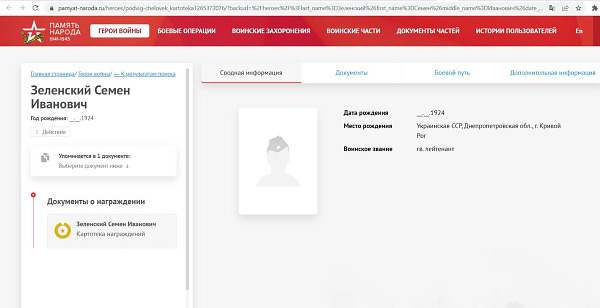
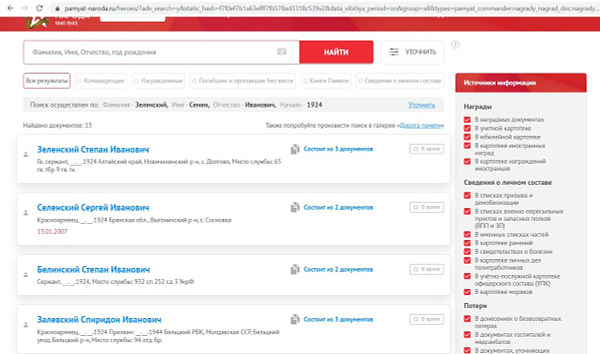
I love me some genealogy as careful readers of this site will know well. I’m often surprised at how often the son of the mobster ends up serving the intelligence service. I have known the children of mobsters who have done great services for the United States of America.
Many of these people I consider great friends though they often lie about what their family was up to in the old country or in the pre-Internet era. They should take some comfort in the fact that so many of the American Founders were themselves criminals and bootleggers. Why, Ben Franklin was even an extortionist who threatened to publish salacious bits about local officials if they didn’t give him the local publishing contracts. Today he’s on the $100 bill, one of the few non-presidents on our currency.
But every man — mobster and bureaucrat alike — is needed in our hour of need. The problem of our time is when the sense making of the bureaucracies gets eroded and whose wealth gets appropriated (or taxed) to pay for the deficits.
Technology can help and should help to make the state more efficient but then who pays for that technology’s development?
A final note:
Follow the foreign policy experts we aren’t supposed to consider experts.

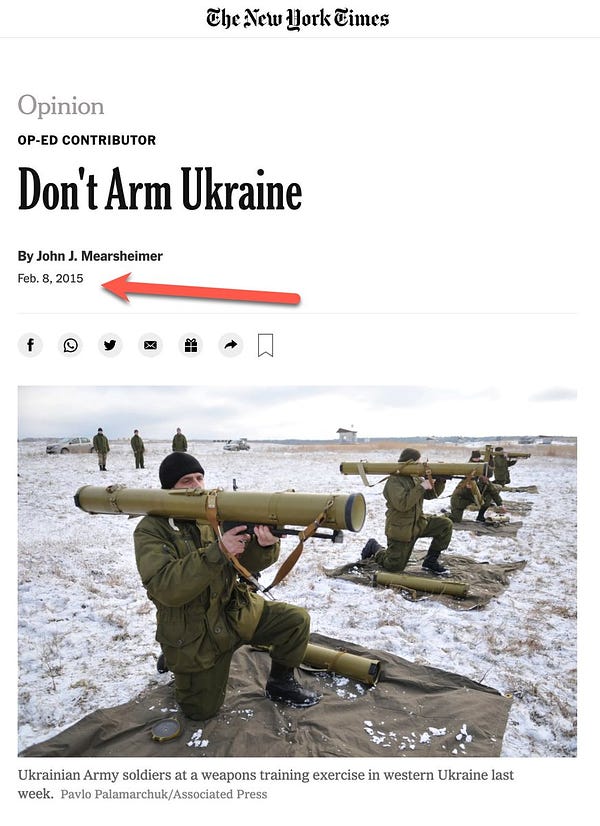
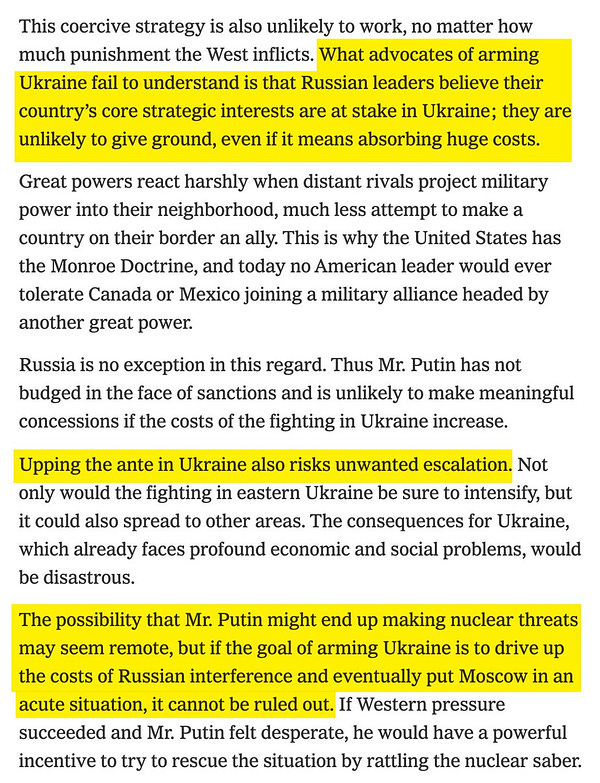
I tend to keep score so if you predict things accurately, I might even come to admire your judgment.
You aren’t supposed to ask what else was Mearsheimer right about, though. Don't ask!
Now what is my grand conclusion?
These things are very complicated. Resist easy answers. Read, debate, and above all, use your mind. Don't allow other people to assign your thoughts to you.



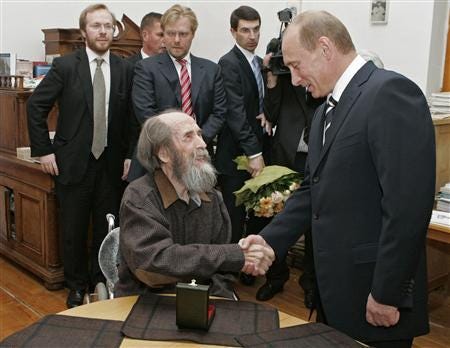
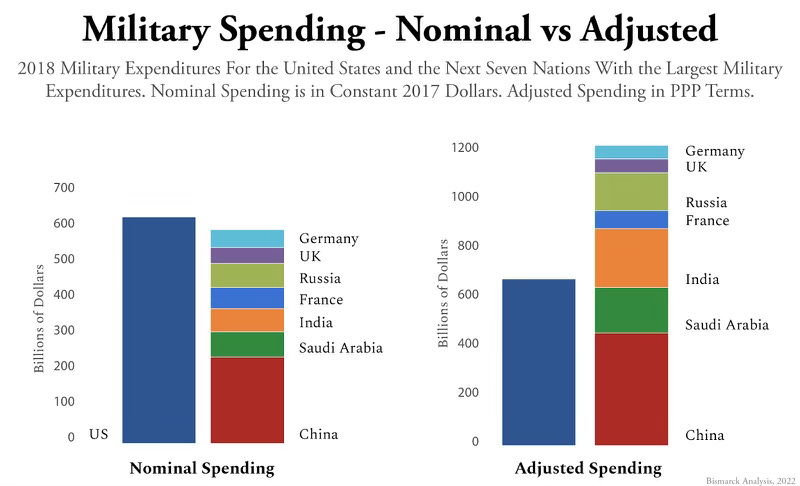
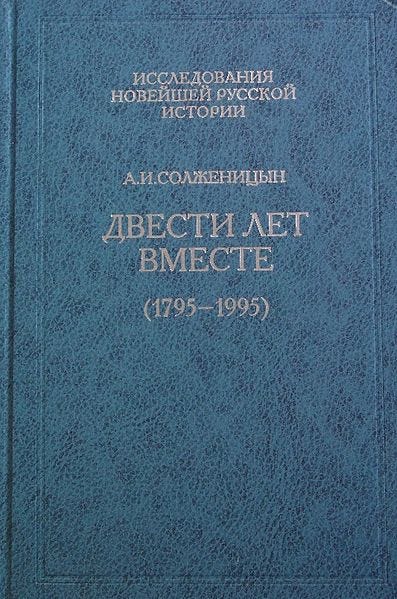
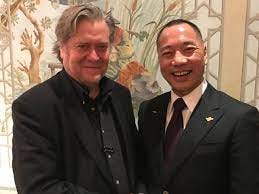
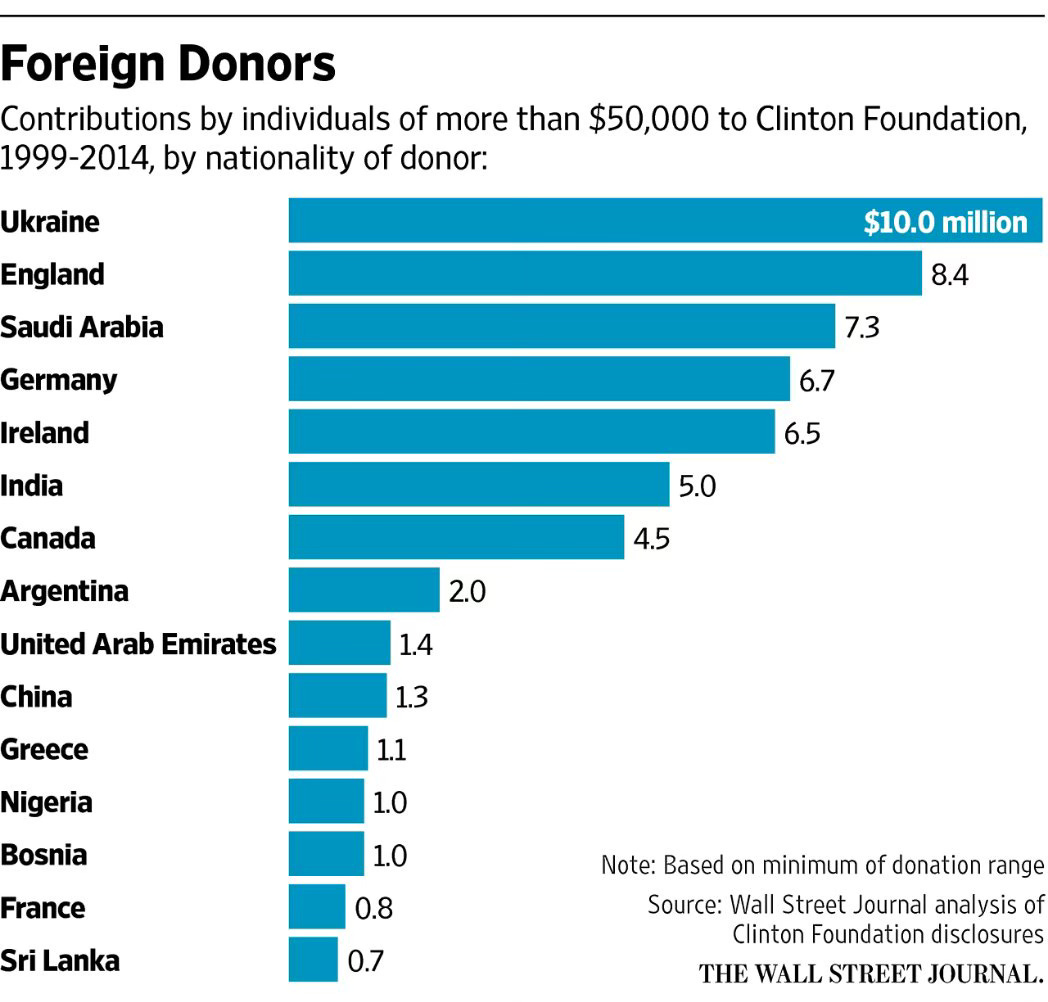




You are doing some of your finest work Charles. I know just enough to be lonely. I can’t imagine how isolated you most feel. Information has never been so easily accessed and yet it seems like people are significantly more ignorant than they were 50-70 years ago.
You nailed it on “..feelings don’t care about your facts” comment. And yes, connecting the dots tells a bigger story than most people can handle.
Charles, I’m a Thiel apologist as well and have been wandering the wilderness alone since December 15, 2016 after an epiphany. I consider you the single greatest resource I’ve ever come across, and I can’t believe that I just now found you. I am blown away by the amount of dots you are connecting these past couple days . The way you write and think is so incredibly beyond me and so inspiring, I felt like I’ve met my leader in some calling that I’ve been obsessed with for years. You seem to embody the Thiel ethos objective 100% and it’s your love that I can sense and I’m attracted to. You said you were looking for soldiers and that has been and is me. I would love to talk to you if you have time. I have so many questions for you I don’t even know where to start; I’m kind of giddy right now! Yes, let’s do the genetic profile on me and due diligence. John Hooker